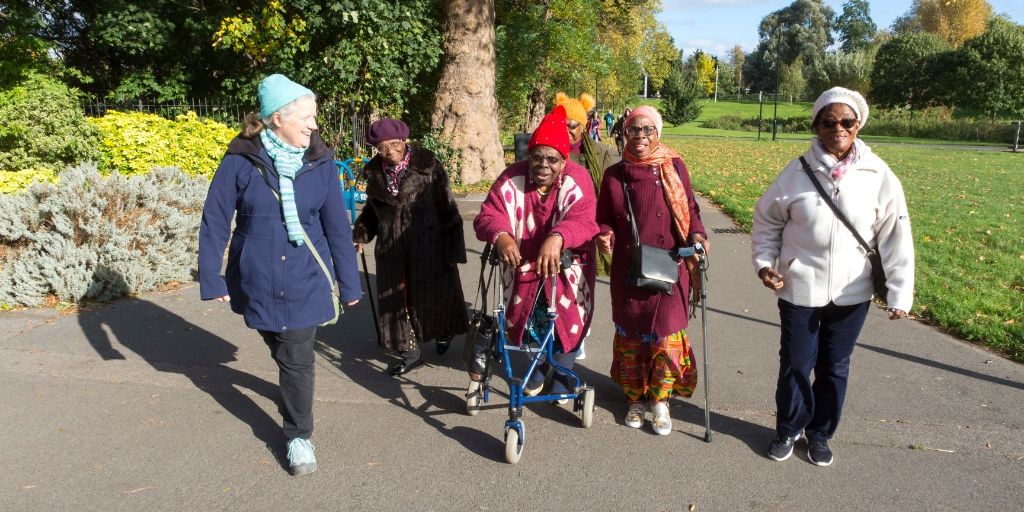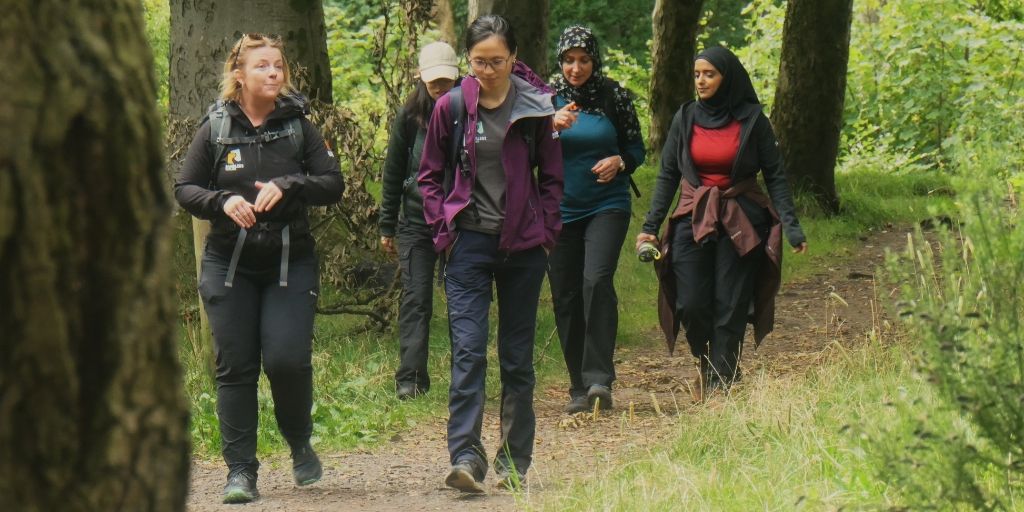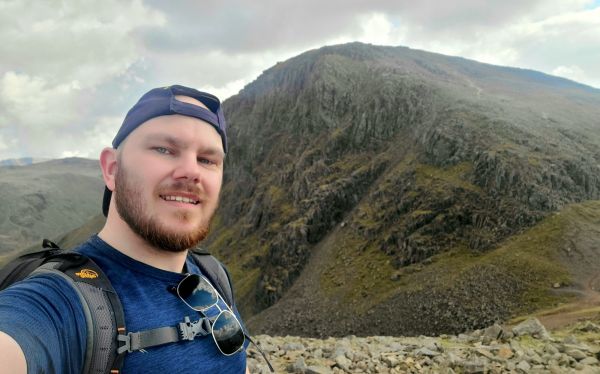Equity and diversity
Ensuring everyone has equal opportunities

Our Equity, Diversity and Inclusion journey
At the Ramblers we open the way so everyone can get out and go walking.
Across Britain, we break down barriers that stand in the way and make sure everyone has the opportunity to enjoy walking.
We’re committed to fostering an environment that values and celebrates everyone’s unique experiences, perspectives and backgrounds. We recognise that systems of inequalities exist which create barriers to people participating in sport and physical activity, including walking.
We want everyone to feel welcome in our organisation and wherever they enjoy walking.
While we recognise it is important that we address a broad range of barriers that different groups may face, we have identified four initial areas of focus to ensure that we can deliver clear impact against our aim to improve participation of communities that have the least access and most barriers to the outdoors.
There is data that demonstrates people from these groups are under-represented in the outdoors community as a whole and in outdoor leadership roles.
Our four areas of focus
People from Global Majority backgrounds
People from Global Majority backgrounds make up only 3% of the Ramblers membership, despite representing 17% of the British population.
We believe we can play an important leadership role in making the outdoors more welcoming and we have committed to being an anti-racist organisation.
Our data shows that people from Global Majority backgrounds represent the following percentages of each group:
- British Population: 17%
- Outdoors community: 4%
- Ramblers Staff: 8%
- Ramblers Volunteers: <0.5%
- Ramblers Members: 3%

People from less well-off backgrounds
Research by the Ramblers and others has consistently shown that people from less well-off backgrounds and neighbourhoods have less access to local paths and green spaces.
Research by the BMC found that people on the living wage are twice as likely to never visit the countryside compared to those who earn more. They are also much less likely to take part in outdoor activities including walking.
We believe we have a role to play in opening up more opportunities for people in less well-off communities to enjoy walking.
To identify which neighbourhoods face disadvantage, the Ramblers uses the Index of Multiple Deprivation (IMD) in England and the equivalent tools in Wales (WIMD) and Scotland (SIMD). In line with advice from the Social Mobility Commission, we use a different method to assess the socio-economic background of staff.
Our data shows that people from deprived backgrounds represent the following percentages of each group:
- Ramblers Volunteers: 4% are from the 20% most deprived neighbourhoods of the British population, and 25% are from the 50% most deprived neighbourhoods of the British population
- Ramblers Members: 8% are from the 20% most deprived neighbourhoods of the British population, and 28% are from the 50% most deprived neighbourhoods of the British population.
Our data shows that people from working class or lower socio-economic backgrounds represent the following percentages of each group:
- UK Workforce: 39%
- Civil Society workforce: 32%
- Ramblers workforce: 30%
People with sensory and physical disabilities
Paths are the main way most of us get into the outdoors. But our research shows that preventable issues are stopping 56% of people with physical and sensory disabilities from enjoying the benefits of getting outdoors. We are committed to tackling these unnecessary barriers to ensure more people are able to get out walking, regardless of ability.
Our data shows that disabled people represent the following percentages of each group:
- British population: 18%
- Outdoors Community: 11%
- Ramblers Staff: 13%
- Ramblers volunteers: 6%
- Ramblers members: 9%
Women
Unlike many sports, physical activities and outdoor pursuits, research shows that more women than men are regular leisure walkers and 53% of the Ramblers members are women.
However, there is a tendency to undervalue women as leaders, to underestimate their technical skills and to ignore the potential impact of menstruation and menopause on those who enjoy walking.
Indeed, research by This Girl Can shows that 84% of women want practical support to make them feel more welcome in physical activity settings. We are therefore committed to celebrating women’s achievements and to challenging sexism.
Women are under-represented in the wider outdoors community and despite being the majority of Ramblers members they are under-represented in voluntary leadership roles in the Ramblers.
Our data shows that women represent the following percentages of each community group:
- British population: 51%
- Outdoors Community: 42%
- Ramblers Staff: 58%
- Ramblers volunteers: 42%
- Ramblers members: 53%
In addition to these four areas of focus we will of course uphold our obligations under the Equality Act 2010. We will also look for opportunities for the Ramblers, and our partner organisations, to break down barriers and address underrepresentation of other characteristics across the charity and the wider outdoors community.

Progress to date
In line with the charity’s strategic ambition to achieve equitable access for all communities to walk outdoors we have:
- Trained and supported staff on the topic of anti-racism and begun working with a specialist agency – Amp Up Your Voice – to support our journey towards becoming an anti-racist organisation.
- Consulted with staff about their experiences and how we can achieve our EDI goals
- Updated our recruitment processes, including broadening the range of media we advertise in and shifting to anonymous shortlisting to minimise unconscious bias
- Become a Living Wage/London Living Wage employer and a Disability Confident employer.
- Delivered a programme of training sessions for staff and volunteers on how to make our walking activities more inclusive for people with disabilities
- Provided a platform via our website and Walk magazine for people from Global Majority backgrounds to explain their experiences and feelings relating to racism in the outdoors.
- Worked in 15 cities across Britain in 2025 to deliver the Out There Award – offering a pathway into the outdoors for 123 young adults facing barriers
- Supported 25 groups of people from global majority or refugee/asylum seeker backgrounds to introduce them to the outdoors in London, Manchester and across Scotland, and delivered walk leadership sessions for 71 participants. In Scotland this work has also included fully training community champions as qualified walk leaders and appointing our first paid community outreach trainee from within the communities we have worked with.
- Teamed up with Paralympian David Weir and accessibility champions Bethney Handly & Debbie North to highlight the impact of poor-quality paths on people with disabilities or mobility issues.
- Appointed a team of community development officers to work with excluded communities across Britain, based on the Index of Multiple Deprivation, and developed a framework that ensured their work was driven by these communities
- Worked with young women in less well-off communities across North Wales to provide an introduction to walking and the local green spaces as well as building confidence and friendships.
- Hosted an online event in collaboration with blind adventurer and President of the Ramblers, Amar Latif OBE to explore the topic of walking with visual impairment, providing advice on how best to support visually impaired walkers.
Future plans
We will continue to educate ourselves on the issues associated with inequalities, and increase our engagement with excluded communities, in order to:
- improve diversity and representation across the charity, and the wider outdoors community
- embed our understanding of exclusive behaviours and how to address discrimination
- make sure the benefits of walking outdoors are available to all
This will be an ongoing journey, and we will be continually evaluating our policies, practices, and culture to ensure that we are living up to our values and removing barriers to equality. We will keep checking our progress and sharing updates.
Notes and External Data Sources
All percentages exclude those who have not answered the question
- Population comparators - Census for England and Wales, 2021 & Scotland, 2022
- Outdoors Community – Your Movement Matters, 2021
(UK & Ireland outdoor participants, disability includes long-term conditions but not mental health)
-
Socio-Economic Background (SEB) comparators – Social Mobility Commission, 2022; DCMS 2024

Safeguarding
Our duty of care to our employees, members, volunteers, supporters and members of the public.

Challenging perceptions of the Ramblers
Arron, the chair of Fillyaboots Merseyside Young Walkers talks about being a young, LGBT+, working class Rambler.

Organising walks for asylum seekers
Mole Valley Ramblers are giving asylum seekers in Surrey the opportunity to get out walking in the beautiful Surrey Hills.

A family friendly walk on the Northumberland coast path
Zahrah Mahmood and her family explore the natural beauty of the Northumberland section of the England coast path.